Home | Category: Muslim Beliefs / Islam, Muslims, God and Religion
MUSLIM BELIEFS
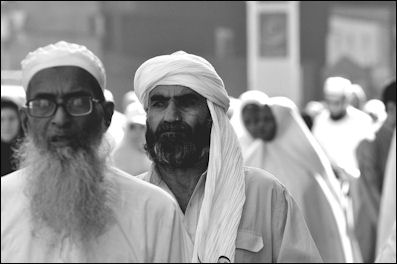
Hajj pilgrims Islam is regarded as a way of life (“din” , sometimes translated as religion) that predates Muhammad and goes back to the creation of man. Muslims are expected to submit to Allah and the divinely-revealed laws of in the Qur’an, Islam’s holy book. These laws cover a wide range of activities.
Muslims believe in direct communion with God and submission to his will. Muslims believe that Muhammad transmitted the will of God to mankind, and that each individual stands alone in direct relationship with God, surrendering himself (“ aslama” ) to His mercy. The relationship is often compared with a master (God) and slave (believer) with the master making demands and the slave having no rights. Those who follow the demands are given privileges. Non-Muslims are regarded as people who have not fulfilled the demands and thus are not entitled to the privileges.
John L. Esposito wrote in the “Worldmark Encyclopedia of Religious Practices”: The word "Islam" means "submission" to the will of God and "peace," the interior peace that results from following God's will and creating a just society. Muslims must strive or struggle (jihad) in the path (Shariah) of God in order to implement his will on earth by working to establish a just society or to expand or defend the Muslim community. Muslims believe that the Qur’an is the final, complete, literal, eternal, uncreated word of God, sent from heaven to the Prophet Muhammad as a guide for humankind (Koran 2:185).Thus, the Qur’an does not reveal God per se but, rather, God's will, or law, for all of creation. [Source: John L. Esposito “Worldmark Encyclopedia of Religious Practices”, 2000s, Encyclopedia.com]
One of Islam’s attractions is its simplicity. Seyyed Hossein Nasr wrote in the “Science and Civilization in Islam: “The creed of Islam "there is no divinity other than God and Muhammad is his prophet" summarizes in its simplicity the basic attitude and spirit of Islam. To grasp the essence of Islam, it is enough to recognize that God is one, and that the Prophet, who is the vehicle of revelation and the symbol of all creation, was sent by him. This simplicity of the Islamic revelation further implies a type of religious structure different in many ways from that of Christianity. There is no priesthood as such in Islam. Each Muslim being a "priest" is himself capable of fulfilling all the religious functions of his family and, if necessary, of his community; and the role of the imam, as understood in either Sunni or Shia Islam, does not in any way diminish the sacerdotal function of each believer. [Source: Seyyed Hossein Nasr, “Science and Civilization in Islam,” New American Library. NY 1968]
Websites and Resources: Islam IslamOnline islamonline.net ; Institute for Social Policy and Understanding ispu.org; Islam.com islam.com ; Islamic City islamicity.com ; BBC article bbc.co.uk/religion/religions/islam ; University of Southern California Compendium of Muslim Texts web.archive.org ; Encyclopædia Britannica article on Islam britannica.com ; Islam at Project Gutenberg gutenberg.org ; Muslims: PBS Frontline documentary pbs.org frontline
RECOMMENDED BOOKS:
“Islam Beliefs and Teachings” by Ghulam Sarwar Amazon.com ;
“The Five Pillars of Islam: Laying the Foundations of Divine Love and Service to Humanity” by Musharraf Hussain Amazon.com ;
“Islamic Beliefs” by Abdullah A. Hamid al-Athari and Nasiruddin al-Khattab Amazon.com ;
“The Oxford Handbook of Islamic Theology” by Sabine Schmidtke Amazon.com ;
“The Cambridge Companion to Classical Islamic Theology by Tim Winter Amazon.com ;
“Introduction to Islamic Creed” by Imam Ibrahim al-Bajuri and Rashad Jameer Amazon.com ;
“Unveiling Islam: An Insider's Look at Muslim Life and Beliefs” by Ergun Caner and Emir Fethi Caner Amazon.com ;
“Muslims: Their Religious Beliefs and Practices” by Teresa Bernheimer and Andrew Rippin Amazon.com ;
“Islamic Theology: Traditionalism and Rationalism” by Binyamin Abrahamov Amazon.com ;
“Growing Up Muslim: Understanding the Beliefs and Practices of Islam” by Sumbul Ali-Karamali Amazon.com ;
“Islam Explained: A Short Introduction to History, Teachings, and Culture” by Ahmad Rashid Salim Amazon.com ;
“No God but God” by Reza Aslan Amazon.com ;
“Welcome to Islam: A Step-by-Step Guide for New Muslims” by Mustafa Umar Amazon.com ;
“The New Muslim's Field Guide” by Theresa Corbin, Kaighla Um Dayo Amazon.com ;
“Islam, a Short History “ by Karen Armstrong Amazon.com ;
“Muslims of the World: Portraits and Stories of Hope, Survival, Loss, and Love” by Sajjad Shah , Iman Mahoui, et al. Amazon.com ;
“Muhammad: A Prophet for Our Time” by Karen Armstrong Amazon.com ;
“The Holy Quran” Arabic Text English Translation (English and Arabic Edition) Leather Bound
Amazon.com ;
“The Holy Qur'an with English Translation and Commentary” by Maulana Muhammad Ali Amazon.com
Core Muslim Beliefs and Islam as a Way of Life
The Qurʾan contains the core beliefs of Islam. 1) The most prominent is belief in a single supreme God, Allah. It also requires Muslims to believe in 2) the revealed books of Allah, the Qur’an; 3) in Allah's many prophets, including Abraham, Moses, and Jesus Christ; 4) in a belief in life after death; and 5) acceptance of an End of the World scenario with Allah making a judgment on who will go to heaven. [Source: Encyclopedia.com]
Core Muslim beliefs also include a belief in Allah's messengers, the angels. Muslim beliefs are based on what is found in the Qur’an, which is regarded a revelation of God’s Will. Mankind is expected to show their respect and gratitude for this. The Qur’an does not contain a system of doctrines per say. Mostly what it offers are general principals.
Islam has been described as “a prescription for harmony in everyday life.” The Qur’an promises “peace” to this who follow the “straight path.” It and the Hadith offers rules and advise on everything from what to eat, how to raise children and wash oneself. The day is divided by prayers and scriptures memorized from the Qur’an are central to education, weddings, funerals and holidays.
According to the “Worldmark Encyclopedia of Religious Practices”: Many Muslims describe Islam as "a total way of life." They believe that religion cannot be separated from social and political life, since religion informs every action a person takes. The Qur’an provides many passages that emphasize the relationship of religion to the state and society. Muslims see themselves as God's representatives, with a divine mandate to establish his rule on earth in order to create a moral and just society. The Muslim community is thus seen as a political entity, as proclaimed in the Qur’an 49:13, which teaches that God "made you into nations and tribes." Like Jews and Christians before them, Muslims believe that they have been called into a covenant with God, making them a community of believers who must serve as an example to other nations (2:143): "You are the best community evolved for mankind, enjoining what is right and forbidding what is wrong" (3:110). [Source: John L. Esposito “Worldmark Encyclopedia of Religious Practices”, 2000s, Encyclopedia.com]
Tenets of Islam
Islam means submission to God, and a Muslim is one who has submitted to the will of God. At the center of the religion is an intense concentration on the unity of God and the separation between God and his creatures. No physical representation of God is allowed. There are no other gods. The duty of humanity is to profess the simple testimony: "There is no god but God (Allah), and Muhammad is his Prophet." Obedience to God's will rests on following the example of the Prophet in one's own life and faithfulness to the revelations collected into the most sacred text, the Quran. [Source: Library of Congress *]
The central beliefs of Islam are monotheism and Muhammad's status as the "seal of the Prophets," that is, the final prophet to whom God revealed messages for the spiritual guidance of humanity. Jesus Christ and the prophets of the Old Testament are also accepted as Islamic prophets. Muslims who profess belief in God and Muhammad's prophethood, pray regularly, and live by Islamic ethical and moral principles are assured that their souls will find eternal salvation in heaven. *
People who obey God's commandments and live a good life will go to heaven after death; those who disobey will go to hell. All souls will be resurrected for a last judgment at the end of the world. Muslims view themselves as followers of the same tradition preserved in the Judaic and Christian scriptures, accept the prophetic roles of Ibrahim (Abraham), Musa (Moses), and Isa (Jesus), and view Islam as the final statement of revealed truth for the entire world.*
Regulation of the Muslim community rests primarily on rules in the Quran, then on authenticated tales of the conduct (sunna ) of the Prophet Muhammad, then on reasoning, and finally on the consensus of opinion. A pious Muslim strives to follow a code of ethical conduct that encourages generosity, fairness, chastity, honesty, and respect. Certain acts, including murder, cruelty, adultery, gambling, and usury, are considered contrary to Islamic practice. Muslims also are enjoined not to consume carrion, blood, pork, or alcohol. *
Islam, God and Monotheism

Allah Islam is a monotheistic religion, This means that its followers believe in one supreme God — and this God only. The God of Islam is called Allah, a name that comes from the Arabic phrase al-ilah, meaning "the One True God."
Muslims believe that Islam is the religion of God, possessing his final and complete word, the Koran, and his final prophet, Muhammad. Thus, while God's revelation had been revealed previously and covenants had been made with other communities, such as Jews and Christians, Muslims believe that Islam possesses the fullness of truth. [Source: John L. Esposito “Worldmark Encyclopedia of Religious Practices”, 2000s, Encyclopedia.com]
Judaism and Christianity are also monotheistic religions. The foundation of the Islamic faith is the belief that: "There is no God but Allah, and Muhammad is his prophet." Tied to this belief are the themes which are repeated again and again, the Oneness of God, One in his nature, the only Real and Eternal. One reason Islam frowns upon idols and rival religions is that these are challenges to the belief that there is one only God, Allah.
A Muslim stands in a personal relationship to God; there is neither intermediary nor clergy in orthodox Islam. Those who lead prayers, preach sermons, and interpret the law do so by virtue of their superior knowledge and scholarship rather than any special powers or prerogatives conferred by ordination.
See Separate Article: ALLAH, CREATION, AND MUSLIM BELIEFS ABOUT GOD africame.factsanddetails.com
Role of Muhammad in Islam
Muhammad viewed himself as a sort of religious guide. He never say himself as the leader of a religion and abhorred the idea of being an object or worship. Charles F. Gallagher wrote in the International Encyclopedia of the Social Sciences: Muhammad’s position as the sole communicant of God’s word to man is attested in the basic Muslim profession of faith: “There is no God but God and Muhammad is His Prophet.” This credo, although it does not occur in a single phrase in the Qur’ān itself, has become the foundation of Muslim self-identification. It differentiates the believer from the nonbeliever and Islam from other religions by emphasizing that Muhammad is not one prophet among many but the seal of the prophets and that the revelation given to him was the ultimate and unchangeable exposition of divine will. [Source: Charles F. Gallagher, International Encyclopedia of the Social Sciences, 1960s, Encyclopedia.com]
Muhammad is called the "seal of the Prophets"; his revelation is said to complete for all time the series of biblical revelations received by the Jews and the Christians. Prophets and sages of the Judeo-Christian tradition, such as Abraham, Moses, and Jesus (Ibrahim, Musa, and Isa, respectively, in the Arabic Islamic canon) are recognized as inspired vehicles of God's will. Islam, however, reveres as sacred only God's message, rejecting Christianity's deification of the messenger.
The function of the hadīth (a law or idea based on the words or actions of Muhammad) reinforced this position, as may well have been one of its main purposes, by preserving for later generations a portrait of the personality of Muhammad in warm and simple details which link the believer to him in an atmosphere of pious affection that has grown through the centuries. Through the device of the hadīth, which contrasts strongly with the formalism and transcendentalism of the Qur’ān, Muhammad is kept from becoming a dim historical figure; he emerges as a venerable, just, but understandable human leader of his flock. In this way Islam maintains the principle of the strictest monotheism, while tempering it with a human touch which, to judge by the historical experience, has fulfilled the needs of ordinary Muslims in all ages.
It is true that this devotion has sometimes seemed to approach adulation or even outright worship, particularly in the past century, when a new consciousness of Christianity led some Muslim biographers of Muhammad to present his life in ways that clearly reveal the influence of the story of Jesus. However, both orthodox Muslim thought and the practice of the masses have kept the fine distinction between ceremonial veneration and anthropolatry.
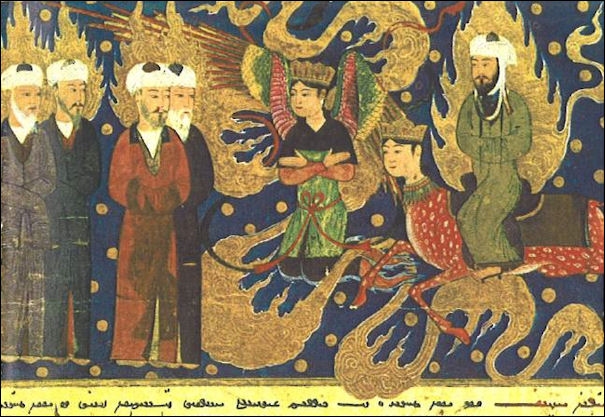
Muhammad meets prophets
Muslims, Christians and Jews — People of the Book
Jews, Christians, Muslims are monotheists who believe in one God who is the creator, ruler of the universe and judge of mankind. According to Muslims they all believe in the same God and Muslims believe that they are part of a string religious traditions that includes Judaism and Christianity. Jews, Christians and Muslims all regard their sacred scriptures as the word of God, acknowledge Abraham as their Patriarch, and have end of the world scenarios in which God meets out justice. Muslims refer to members of all three religions as “People of Book.”
Christianity, Judaism and Islam also all stress obedience, purity and call on mankind to repent. Christianity and Islam have similar visions of heaven, hell and the Last Judgement and hold many of the same religious figures in high regarded. These three religions are historical religions, a concept quite alien to Buddhism and Hinduism.
Muslims believe that Islam supercedes Judaism and Christianity. They regard Islam as completed form of Judaism and Christianity that have been purified of errors. Muhammad hoped monotheism would bring an end to the violent tribalism that prevailed in the Arab world. He believed, the historian Karen Armstrong wrote: “A single deity who was the forces of all worship would integrate society as well as the individual.” In contrast to Christianity, in which theology prevails, for Islam, as for Judaism, the primary religious concern is law. Christianity emphasizes orthodoxy (correct doctrine or belief), while Islam, as demonstrated by the Five Pillars (fundamental observances), emphasizes orthopraxy (correct action).
John L. Esposito wrote in the “Worldmark Encyclopedia of Religious Practices”: In addition to belief in a single, all-powerful God, Islam shares with Judaism and Christianity belief in the importance of community-building, social justice, and individual moral decision-making, as well as in revelation, angels, Satan, a final judgment, and eternal reward and punishment. Therefore, Islam was not a totally new monotheistic religion and community that sprang up in isolation. Muslims believe that Islam was, in fact, the original religion of Abraham. The revelations Muhammad received were calls to religious and social reform. They emphasized social justice (concern for the rights of women, widows, and orphans) and warned that many had strayed from the message of God and his prophets. They called upon all to return to what the Qur’an refers to as the straight path of Islam or the path of God, revealed one final time to Muhammad, the last, or "seal," of the prophets. [Source: John L. Esposito “Worldmark Encyclopedia of Religious Practices”, 2000s, Encyclopedia.com]
Islamic Views on Mankind
Man is Allah's highest creation, but has limitations and commits sins. All people were created by God and return to him after their deaths Those who submit to God return to a state of sinlessness. The sinless go to paradise. Man has been led astray by Satan. Adam was the first man. He was expelled from paradise for eating from the forbidden tree. Because of mankind’s proclivity to sin, Allah, from time to time, has sent prophets to the Earth to set mankind straight. All people are expected to form a single community, or “umma” , whose every action should be a confirmation of the fact that “there is no God but God.” The umma should be held together by the principals of a just society characterized by compassion and fair distribution of wealth.
According to the “Worldmark Encyclopedia of Religious Practices”: Because God breathed his spirit into Adam, the first human being, humans enjoy a special status as God's representatives on earth. The Qur’an teaches that God gave the earth to human beings as a trust so that they can implement his will. Although Muslims believe in the Fall of Adam and Eve in the Garden of Eden, in contrast to Christianity there is no doctrine of an inherited original sin and no belief in a vicarious suffering or atonement for humankind. The punishment of Adam and Eve is believed to result from their own personal act of disobedience to God. Each person is held responsible for his or her own actions. [Source: John L. Esposito “Worldmark Encyclopedia of Religious Practices”, 2000s, Encyclopedia.com]
Human beings are mortal because of the human condition, not because of sin or the Fall of Adam and Eve. Sin is the result of an act of disobedience rather than a state of being. In Islam the Fall demonstrates human sin, God's mercy, and human repentance. Islam emphasizes the need to repent by returning to the straight path of God. The Qur’an does not emphasize shame, disgrace, or guilt but, rather, the ongoing human struggle—jihad—to do what is right and just.
Community and the Personal Nature of Islam
Islam is regarded as a essentially a personal religion not tied to any specific social structure or organization. The Qur’anic dictum “No soul shall bear the burden of another” implies the personal responsibility of the Believer and reject any spiritual hierarchy. Even so Islam has a complex of divinely ordained social institutions.
Because of the emphasis on a personal relationship with God, Islam tends to be an intensely personal experience between the individual and God. Outside of this relationship life revolves around the community. There is no dichotomy between the sacred and profane, the religious and political, everyday life and worship. There are all mixed together. Sex is fine as long as it done in accordance with Muslim rules. Even violence is justifiable.
A blonde, blue-eyed American girl who converted to Islam told National Geographic, “Everything is much simpler now. It’s just me and God. For the first time in my life I’m at peace...I used to get so depressed trying to conform to our crazy culture and its image of what a woman should be...and our hunger for material wealth. It left me feeling empty all the time.”
John L. Esposito wrote in the “Worldmark Encyclopedia of Religious Practices”: A Muslim's obligation to be God's servant and to spread his message is both an individual and a community obligation. The community is bound not by family or tribal ties but by a common faith, which must be acted out and implemented. The primary emphasis is upon obeying God as prescribed by Islamic law, which contains guidelines for both the individual and the community. [Source: John L. Esposito “Worldmark Encyclopedia of Religious Practices”, 2000s, Encyclopedia.com]
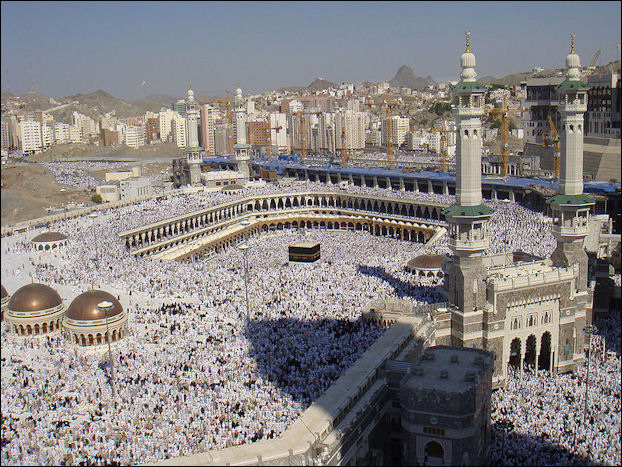
Hajj pilgrims gather around the Kaaba at al-Haram Mosque
Muslim Theology
Muslims as a rule are not big on religious doctrine, dogma or speculating too much about what is unfathomable. Existence and the nature of God is not something is not debated or looked at too introspectively. Questioning many aspects of Islam is not tolerated and can be regarded as blasphemous. Shiites and Sufis are more prone to doctrinal exploration than Sunnis.
There has traditionally been no distinction between science and religion. "Muslim science always retained a religious motivation. It assumed the truth of the Qur’an, and its objective was to understand the relationship between the truth and the observable world."
With the development of Muslim theology came the understanding that some texts can be interpreted figuratively and symbolically rather than literally. These conclusion were reached after contrasting description of seeing god in paradise and words written in the Qur’an with the concepts that God is inaccessible and unknowable. Disputes related to these issues was heated — often with conservatives relying on slogans and Qur’anic texts to back up their positions while reformers used reasoned arguments — and sometimes lead to violent clashes. The masses often sided with the conservatives and opposed the confusion and lack of absolutism generated by new intellectual ideas.
Muslim scholars who used reasoning to explore their religion were largely on the fringe and relegated to small schools in the first centuries after Muhammad’s death but over time their numbers grew and their influence in large more traditional schools also grew. These scholars argued there was a place for free will, choice nd making decisions about good and evil using reason within Islam
Conversion, Salvation and Religious Experiences
Converting to Islam is easy and quick. All one has to do is utter a two-line declamation of faith: the “ shahada” : “”La ilaha illa Allah Muhammad rasul Allah” “ (“There is no god but God, and Muhammad is his prophet”). Such a belief should be unforced and technically performed in front of two male witnesses. In the West the process is often certified by going into the backroom of a mosque and signing some papers in Arabic and English while holding a Qur’an.
Muslims sometimes use the expression “salvation” but it does not mean redemption from original sin as it does to Christians. Rather it refers to the submission of a Muslim community to Allah’s will. George Packer wrote in The New Yorker, “The quest for spiritual meaning is typically a personal matter in the West. In the Islamic world it often leads the seeker into some kind of collective action, informed by utopian aspirations, that admits no distinction between proselytizing, social reform and politics.” Tawba describes the Islamic concept of repentance.
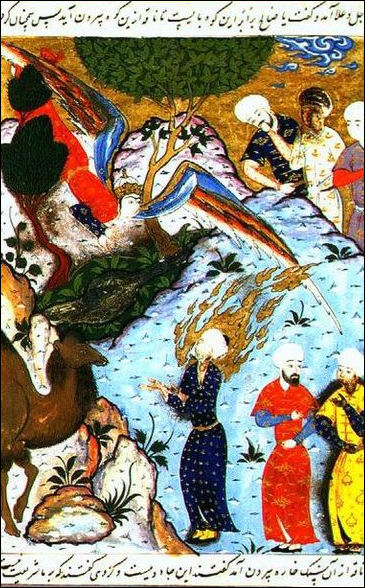
Salih and the she camel Converting to Christianity is regarded as a form of apostasy, a crime punishable by death. Explaining why such a conversion is such a serious offense an Afghan imam told the Washington Post, “You must understand how shameful it is for us that a Muslim would become a Christian. If other people want to come to Islam, we encourage and appreciate them. But ours is the complete and final religion. If you leave it, that is like throwing God away...If you leave Islam, our law says you must be killed.”
Muslims sometimes makes decisions based on perceived visions and signs from God. One imam in the United States told the New York Times he decided to move to a new mosque after hearing a voice that told him that the new mosque was “in peace.” The decision was confirmed by a visit to the town where the new mosque was located where, he said, the grass whispered, the crickets chirped and the stars blinked from above.
Predetermination, Fate and Free Will
Liberty and freedom are viewed as things given by God to the faithful not things that are guaranteed by a secular society. Only God has the power and disposition to give freedoms and take them away and he bestows them on the Muslim community and thus for an individual to realize the he must perform his duties within the community.
Becoming a Muslim entails giving up a sense of being in control and letting things be decided by fate and God’s will. Predetermination and submission to fate have been cornerstones of the Muslim faith, with the Qur’an stating that God “guides who he will and turns astray who he wills” and it is he creates and men and creates all they do. According to Muslim scholars, "Every person's life span is determined by Allah, when he is still a fetus in his mother's belly. Allah also knows how every person is to meet his or her death. He does not however cause an accident fire or disturbance. It is people who do that." [Source: Arab News, Jeddah]
The concept of pre-determination is summed up by the expression "inshallah," meaning “it is god's will.” This is often represented as a kind a blithe, fatalistic attitude in which people do what do without worrying about consequences — because the consequences have already been predetermined. Repeated injections of “God willing” into statements is an expression of Muslim submission to fate.
People put their hands in God because they believe he helps rather punishes. Sometimes, it has been suggested, that if something awful happens to a Muslim he asks Allah what he has done to be punished rather than seeking justice or making changes to prevent the awful thing from happening again. Muslim believed that you can not save yourself from death. When your time comes there is nothing you can do about it. It has been suggested that people living in dangerous places are comforted by this belief.
Predetermination is primarily a Sunni belief. Shiites affirm man's free will. Some Muslims believe “God determines all things, but humans are responsible for acquiring the possibilities God creates for them.” There are a number of Qur’anic verses that proclaim human responsibility and declare that men will be rewarded or punished on the Judgment Day depending on the deeds they perform in their life.
The Shiite belief is essentially as follows: “Human reason is competent to determine good and evil, except in such matters as religious obligation. Men do not themselves possess the power to create actions which belongs to God alone, but they are invested by God with volition whereby they can chose to do good or evil actions, and thus everyone is liable to reward or punishment in future life.” [Source: Encyclopedia of the World’s Religion, H.A.R. Gibb]
The beliefs that free will and reasoning have a place in Islam were advocated by scholars influenced by Greek philosophy Some of their ideas — such as reasoning contradicts revelation — undermined the very foundation of Islam. Conservative Muslims argue against free will, stating that to do so is second guessing Allah and reckoning that someone other than God is involved in the act of Creation. Some go even father and say that anything that comes into existence as a “consequence” of human action is an allusion and the consequence exists only because God allows it. In doing this God creates beliefs and non-belief, piety and impiety as well as concrete things like people and animals. These beliefs remain at the heart of Sunni beliefs today. Tied in to these argument is a suspicion of applying reasoning to the Qur’an and matters of faith.
Sunnah on Destiny
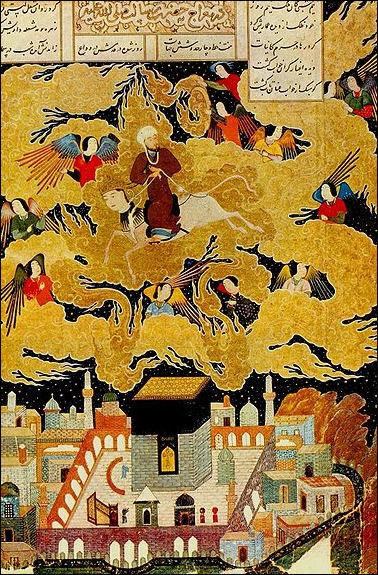
Abdal-Razzak The Sunnahs are the practices and examples drawn from the Prophet Muhammad's life. Along with the Hadiths they are the most important texts in Islam after the Qur’an. They must adhere to a strict chain of narration that ensures their authenticity, taking into account factors such as the character of people in the chain and continuity in narration. Reports that fail to meet such criteria are disregarded.
The Sunnah reads: “The hearts of men are at the disposal of God like unto one heart, and he turneth them about in any way that he pleases. O Director of hearts, turn our hearts to obey thee. The first thing which God created was a pen, and he said to it, "Write." It said, "What shall I write?" And God said, "Write down the quantity of every separate thing to be created." And it wrote all that was and all that will be to eternity. [Source: Charles F. Horne, ed., The Sacred Books and Early Literature of the East, (New York: Parke, Austin, & Lipscomb, 1917), Vol. VI: Medieval Arabia, pp. 11-32]
“There is not one among you whose sitting-place is not written by God, whether in the fire or in paradise. The companions said, "O Prophet! since God hath appointed our place, may we confide in this and abandon our religious and moral duty?" He said, "No, because the happy will do good works, and those who are of the miserable will do bad works."
“The Prophet of God said that Adam and Moses (in the world of spirits) maintained a debate before God, and Adam got the better of Moses; who said, "Thou art that Adam whom God created by the power of his hands, and breathed into thee from his own spirit, and made the angels bow before thee, and gave thee an habitation in his own paradise: after that thou threwest man upon the earth, from the fault which thou committed." Adam said, "Thou art that Moses whom God elected for his prophecy, and to converse with, and he gave to thee twelve tables, in which are explained everything, and God made thee his confidant, and the bearer of his secrets: then how long was the Bible written before was created?" Moses said, "Forty years." Then Adam said, "Didst thou see in the Bible that Adam disobeyed God?" He said, "Yes." Adam said, "Dost thou then reproach me on a matter which God wrote in the Bible forty years before creating me?"
“Ayesha relates that the Prophet said to her, "Do you know, O Ayesha! the excellence of this night?" (the fifteenth of Ramadan). I said, "What is it, O Prophet?" He said, "One thing in this night is, that all the children of Adam to be born in the year are written down; and also those who are to die in it, and all the actions of the children of Adam are carried up to heaven in this night; and their allowances are sent down." Then I said, "O Prophet, do none enter Paradise except by God's mercy?" He said, "No, none enter except by God's favor": this he said thrice. I said, "You, also, O Prophet! will you not enter into paradise, excepting by God's compassion?" Then the Prophet put his hand on his head, and said, "I shall not enter, except God cover me with his mercy": this he said thrice.
“A man asked the Prophet what was the mark whereby a man might know the reality of his faith. He said, "If thou derive pleasure from the good which thou hast done, and be grieved for the evil which thou hast committed, thou art a true believer." The man said, "What does a fault really consist in?" He said, "When anything pricks thy conscience, forsake it." I am no more than man: when I order you anything with respect to religion, receive it; and when I order you about the affairs of the world, then I am nothing more than man.
Averroes on Fate And Predestination

Averroes
Averroës (also called Ibn Rushd, 1126-1198) was an influential Islamic religious philosopher who integrated Islamic traditions and Greek thought. He was born in Cordoba, Spain and died in Marrakech, Morocco and wrote the "Decisive Treatise on the Agreement Between Religious Law" and "The Incoherence of the Incoherence" in defense of the philosophical study of religion. [Source: Encyclopaedia Britannica]
In “Problem Third: Of Fate And Predestination,” Averroes wrote in “On the Harmony of Religions and Philosophy” (1190): “This is one of the most intricate problems of religion. For if you look into the traditional arguments (Hadith) about this problem you will find them contradictory; such also being the case with arguments of reason. The contradiction in the arguments of the first kind is found in the Qur'an and the Hadith. There are many verses of the Qur'an, which by their universal nature teach that all the things are predestined and that man is compelled to do his acts; then there are verses which say that man is free in his acts and not compelled in performing them. The following verses tell us that all the things are by compulsion, and are predestined, "Everything have We created bound by a fixed degree" [Qur'an 56.49]; again, "With Him everything is regulated according to a determined measure" [Qur'an 13.9]. Further, He says, "No accident happened in the earth, nor in your persons, but the same was entered in the Book verily it is easy with God" [Qur'an 57.22]. There may be quoted many other verses on this subject. [Source: “Ibn Rushd: On the Harmony of Religions and Philosophy, in Arabic Kitab fasl al-maqal, with its appendix (Damina). Appended is an extract from Kitab al-kashfan manahij al-adilla, published and translated as: “Averröes, The Philosophy and Theology of Averroes, trans. Muhammad Jamil-al-Rahman (Baroda: A. G. Widgery, 1921), pp. 14-19, 122-131, 204-229, 242-249, 260-283, 300-308. A more recent edition is edited by George Hourani, (Leiden, E. J. Brill, 1959).]

Muslim painting of Musa (Moses) with a cane
“Now, as to the verses which say that man can acquire deeds by free will, and that things are only possible and not necessary, the following may be quoted: "Or He destroys them (by ship-wreck), because of that which their crew have merited; though He pardons many things" [Qur'an 42.32]. And again, "Whatever misfortune befalls you is sent you by God, for that which your hands have deserved" [Qur'an 42.32]. Further, He says, "But they who commit evil, equal thereunto" [Qur'an 10.28]. Again, He says, "It shall have the good which it gains, and it shall have the evil which it gains" [Qur'an 2.278]. And, "And as to Thamud, We directed them, but they loved blindness better than the true directions" [Qur'an 41.16].
“Sometimes contradiction appears even in a single verse of the Qur'an. For instance, He says, "After a misfortune has befallen you (you had already attained two equal advantages), do you say, whence comes this? Answer, This is from yourselves" [Qur'an 3.159]. In the next verse, He says, "And what happened unto you, on the day whereon the two armies met, was certainly by permission of the Lord" [Qur'an 3.160]. Of this kind also is the verse, "Whatever good befalls you, O man, it is from God; and whatever evil befalls you, it is from yourself" [Qur'an 4.81]; while the preceding verse says, "All is from God" [Qur'an 4.80].
“Such is also the case with the hadith. The Prophet says, "Every child is born in the true religion; his parents afterwards turn him into a Jew or a Christian." On another occasion he said, "The following people have been created for hell, and do the deeds of those who are fit for it. These have been created for heaven, and do deeds fit for it." The first hadith says that the cause of disbelief is one's own environments; while faith and belief are natural to man. The other hadith says that wickedness and disbelief are created by God, and man is compelled to follow them.
For the complete article from which the material here is derived see Medieval Sourcebook: Ibn Rushd (Averroës), 1126-1198 CE: Religion & Philosophy, c. 1190 CE, Problem Third: Of Fate And Predestination sourcebooks.fordham.edu
Image Sources: Wikimedia Commons
Text Sources: Internet Islamic History Sourcebook: sourcebooks.fordham.edu Arab News, Jeddah; “Islam, a Short History” by Karen Armstrong; “A History of the Arab Peoples” by Albert Hourani (Faber and Faber, 1991); “Encyclopedia of the World Cultures” edited by David Levinson (G.K. Hall & Company, New York, 1994); “World Religions” edited by Geoffrey Parrinder (Facts on File Publications, New York); “Encyclopedia of the World’s Religions” edited by R.C. Zaehner (Barnes & Noble Books, 1959); Metropolitan Museum of Art, National Geographic, BBC, New York Times, Washington Post, Los Angeles Times, Smithsonian magazine, The Guardian, Al Jazeera, Times of London, The New Yorker, Time, Newsweek, Reuters, Associated Press, AFP, Lonely Planet Guides, Library of Congress, Compton’s Encyclopedia and various books and other publications.
Last updated April 2024
